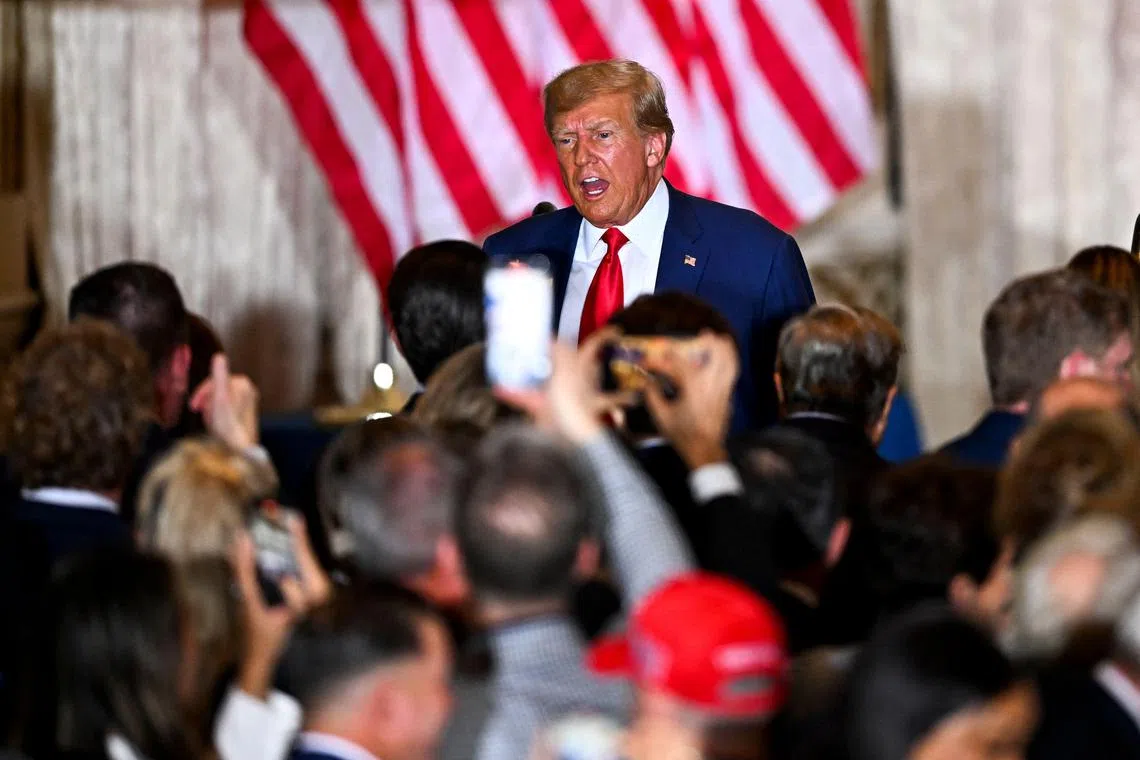After being charged, it may be months before a trial for Trump
Sign up now: Get ST's newsletters delivered to your inbox

Donald Trump has said that he does not believe he can get a fair trial in Manhattan.
PHOTO: AFP
WASHINGTON – Former president Donald Trump’s arraignment hearing on Tuesday
A trial may not be scheduled for months – and is not guaranteed to happen at all – as prosecutors and Trump’s lawyers are expected to argue over the merits of the case and what evidence can be presented to a jury.
Under New York law, district attorneys must turn over much of their evidence to defence lawyers within 35 days of a defendant’s arraignment.
The rules require prosecutors to provide physical evidence such as police reports and photographs, electronic recordings and grand jury testimony, including the names of witnesses.
Prosecutors may request an extension of up to 30 days under exceptional circumstances. They may also request a protective order to shield witness names and information until trial, though judges are not required to grant it.
The defence is also required to disclose certain evidence in its possession 30 days after prosecutors first open their files.
Lawyers from both sides may file motions asking the judge to prevent certain evidence from being used at trial, and hearings on those motions may delay a trial further.
The judge presiding over Tuesday’s arraignment, Mr Juan Merchan, set a schedule for Trump’s lawyers to file motions by Aug 8 and prosecutors by Sept 19, with judge’s orders to come on Dec 4.
Defence lawyers can also file motions asking the judge to dismiss a case.
One of Trump’s lawyers, Mr Joseph Tacopina, previously said that he anticipated filing such a motion. But after the arraignment, he told reporters outside the courthouse that it was too soon to talk about specific details.
Among the possible grounds for a motion to dismiss are assertions that charges are barred by statutes of limitation, which restrict how much time can pass between a crime and charges, or that there has been prosecutorial misconduct.
In high-profile cases, defence lawyers often request a change of venue, arguing that extreme media scrutiny makes it difficult to find unprejudiced jurors in the original location, but judges rarely agree.
It is not clear whether Trump’s lawyers will follow that strategy, and Mr Tacopina said outside the courthouse that it was “premature” to speculate.
But Trump has said that he does not believe he can get a fair trial in Manhattan, which is overwhelmingly liberal and where he was deeply unpopular during his presidency.
On Sunday, Trump wrote on Truth Social, the social network he started, that his case had “a venue where it is IMPOSSIBLE for me to get a Fair Trial (it must be changed!).”
Trump’s lawyers could also request a bench trial, which would not involve a jury and would be conducted by the judge alone. NYTIMES


